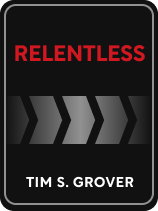

This article is an excerpt from the Shortform book guide to "Relentless" by Tim Grover. Shortform has the world's best summaries and analyses of books you should be reading.
Like this article? Sign up for a free trial here .
Do you want to be the best in your field? Do you want to apply your knowledge to every aspect of life without even thinking about it?
In the self-help book Relentless, motivational speaker and trainer Tim Grover says that he wants you to be unstoppable. One of the few ways to achieve this is to apply knowledge to tap into your primal instincts, which will make life effortless and more meaningful.
Here’s Grover’s lesson on how to apply knowledge so you can become unstoppable in your life.
Using Knowledge To Be the Best
According to Grover, one of the qualities to becoming unstoppable is the ability to direct your instincts—that is, the ability to use your natural animal instincts to accomplish the complex goals your field requires. The key to accomplishing this is to learn how to apply knowledge to master your field of expertise so you can use your knowledge automatically.
(Shortform note: You might assume that your animal instincts are so hardwired into your mind that you can’t tell them what to do. However, this isn’t the case—the rational part of your mind can actually train your instincts. After all, memory and experience can inspire instincts—for example, a child touching a hot stove will learn from that experience, and later will have the instinct to check if a stove is hot before touching it.)
We’ll cover how to direct your instinct to best use your knowledge. We’ll explain why instinct-driven knowledge makes you unstoppable, as well as how you can start using this type of knowledge to pursue your goals.
How to Apply Knowledge Instinctively
Acting on instinct, argues Grover, means acting without consciously thinking. This allows you to better use knowledge of your discipline because you can just act on your knowledge without having to think about the best way to use it. Thinking means opening yourself up to self-doubt and fear, damaging your confidence, and, as a result, your ability to be relentless. On the other hand, by directing your instinct to use your knowledge automatically, you’ll be able to act immediately with no distractions or self-doubts holding you back.
(Shortform note: Research supports Grover’s argument that you can “train” your instincts to rely on the things you know or believe. A study on people who had performed heroic acts by risking their lives to save others revealed that the majority of these people hadn’t considered if trying to save the person was the right thing to do. Instead, they acted intuitively on their existing moral beliefs without taking time to think. This suggests that your more “rational” thoughts and beliefs inspire instinctive action.)
Master Your Field
Grover says that to instinctively apply your knowledge, you need mastery: an understanding of your field so deep that you can access and use knowledge without taking time to think about it. Mastery allows you to address any situation within your field, and to remain calm if circumstances suddenly change. Mastery is better than the analysis and preparation of the great: great people can only prepare for specific situations, and so if circumstances change they can’t adapt quickly.
(Shortform note: Anette Karmiloff-Smith agrees with Grover that true mastery allows you to address any situation, and explains the brain science behind this in Beyond Modularity. She suggests that once you’re skilled enough to perform a task automatically, your brain puts less effort into the task and can use that effort on other things. Your brain then can use this “freed up” power for a more flexible and creative approach.)
For example, a great mechanic repairs a car by researching what they think the problem is and how they can fix it on that specific model. On the other hand, an unstoppable mechanic knows cars so well that not only can they identify what’s wrong right away, but they can also change up their approach to fixing it as needed, depending on the model of the car and the extent of the damage.
Mastering your field requires a lot of hard work over a long period of time, and Grover says there are no shortcuts or easy ways to get it. (Shortform note: If you’re wondering how you might achieve mastery, author and journalist Malcolm Gladwell provides an answer in Outliers. Gladwell suggests that mastering a skill requires 10,000 hours of “deliberate practice”—time spent making specific improvements to perfect each part of your discipline, rather than time spent practicing your discipline as a whole with no specific improvement in mind. However, some of the researchers he cites for this number have taken issue with Gladwell’s interpretation, arguing that the number of hours necessary for mastery depends more on the specific skill one is trying to master.)

———End of Preview———
Like what you just read? Read the rest of the world's best book summary and analysis of Tim Grover's "Relentless" at Shortform .
Here's what you'll find in our full Relentless summary :
- The qualities you’ll need to become the best in your field
- Why sacrifices and discomfort are necessary for growth
- Why you should practice indulging in your primal self






